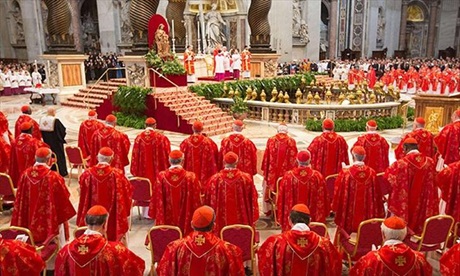Perhaps it could emerge from the current Roman Catholic synodal movement?
I would like to see a Roman Catholic constitutional convention, with a broad selection of lay and ordained members, assisted by historians, theologians, and sociologists.
The task
The task would be three-fold:
First: Draw up a constitution for the Roman Catholic Church, as one of several – very valid and important — Christian traditions.
The constitution would clarify that the one, holy, catholic, and apostolic Christian Community is broader than than just the Roman Catholic Church.
Secondly: Create a new administrative structure, covering all aspects of Roman Catholic ecclesiastical governance, from the bishop of Rome to local bishops and to local parishes.
Thirdly: Clearly establish that the bishop of Rome, the pope, could be a man or a woman and should be elected for a limited term of office by an international body of lay and ordained representatives.
She or he would be the chairperson of an international administrative board of directors. Much of the old Vatican bureaucracy could be dismantled.
Under the new Roman Catholic Constitution, there would be no need for a papal electoral college or a smoking stove in the Sistine Chapel.
The cardinal electors could be retired and hand in their red hats. The old stove that sent up white smoke when a new pope was elected could be put in a papal museum or simply recycled.
Moving one
We need to move ahead. Broad-reaching church reform is necessary. But, I would emphasise that church reform is about much more than the necessary structural institutional changes.
Genuine church reform must be primarily about how people experience and live their Christianity.
About one’s pattern of life. About how one lives respectfully with others and lives with self respect.
The historical Jesus did not establish or lay down any pattern or plan for church structure.
He clearly did emphasise, however, a necessary pattern of life, which we see in the “Sermon on the Mount” found in Matthew 5-7.
It is a message of love, compassion, and selflessness. Jesus encourages his followers to love their enemies, to forgive others and to care for the poor and marginalised.
Paul the Apostle reminds Christians as well, in 1 Corinthians 13:
“Love is patient, love is kind. It does not envy, it does not boast, it is not proud. It does not dishonour others, it is not self-seeking, it is not easily angered, it keeps no record of wrongs.
“Love does not delight in evil but rejoices with the truth. It always protects, always hopes, always perseveres.” Read more
- John A Dick is a historical theologian. Now retired from the KU Leuven. His areas of research, lecturing, and writing are religion and values in the United States, secularisation, and religious fundamentalism.
- He writes at For Another Voice
